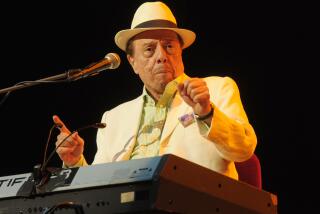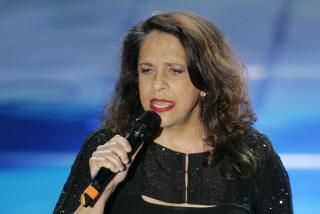It’s a Warm Greeting in S.F. for ‘Father of Bossa Nova’
- Share via
SAN FRANCISCO — Joao Gilberto came on stage at the Masonic Auditorium Friday night so unassumingly that he might--except for the guitar he held--have been mistaken for a stage hand. Looking slight, wearing glasses, barely acknowledging the overflow crowd’s fervent greeting, he simply sat down and began to play the songs that have identified him as the “Father of Bossa Nova” and made him one of Brazil’s most influential musical artists.
The audience, despite its eagerness to hear Gilberto in his first West Coast appearance in decades, was restless at first, far more familiar with the high-decibel sound that accompanies most concerts (even jazz and classical) these days. But after the rustling and the coughing subsided, and he began to work his magic, the room slowly became still. In a few moments, amazingly, the small, intimate voice and the simple, acoustic guitar sound of this remarkable artist reached out to fill the hall.
Initially, there were a few glitches with the sound, with sudden, loud pops frequently bursting out of the speakers. Many listeners, familiar with Gilberto’s insistence upon the proper setting for his music, worried that he might simply leave the stage. But rescue arrived in the form of a young man who darted out and leaned over to speak to Gilberto. Receiving a nod of affirmation, the young man dashed off again and quickly returned with a new microphone.
At that point, Gilberto smiled and murmured, “He’s my son.” It was his only moment of direct interaction with the audience other than through his music.
In fact, however, the intimacy of his presentation, the manner in which he brought new life to extremely familiar material, was far more interactive than an evening’s worth of between-songs chatter. Gilberto’s performance--like that of a classical string quartet--was a brilliant distillation of musical elements, a reduction of words, music, harmony and rhythm to an essence in which every accent, every gesture, every vocalized stress held meaning.
He sang all the familiar bossa nova standards, “Garota de Ipanema,” “Chega de Saudade,” “Desafinado,” “Samba de Uma Nota So” among them. And he added one American standard, “ ‘S Wonderful,” a tune he has been working on for years. His presentation was fundamental--his finger-plucked guitar accompanying whisper-soft vocals, all sung in Portuguese. But the rhythmic surge he was able to generate as he used his thumb to suggest bass drum accents and his other fingers to strike propulsive, harmony-rich chords, was astounding.
Bossa nova (“new fashion” or “new way”) emerged in the ‘50s in Rio as a fascinating hybrid, combining elements of samba with jazz harmonies and the “cool” sound associated with the West Coast American jazz of the period. But it probably wouldn’t have reached beyond the confines of Copacabana without the presence of three remarkable artists working in tandem--Gilberto, songwriter Antonio Carlos Jobim and lyricist Vinicius de Moraes.
More to Read
The biggest entertainment stories
Get our big stories about Hollywood, film, television, music, arts, culture and more right in your inbox as soon as they publish.
You may occasionally receive promotional content from the Los Angeles Times.










